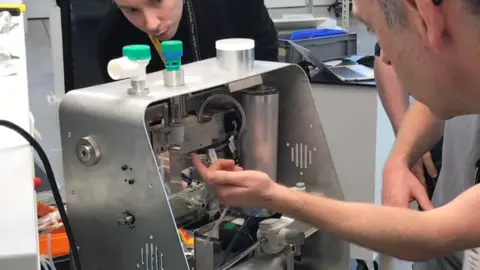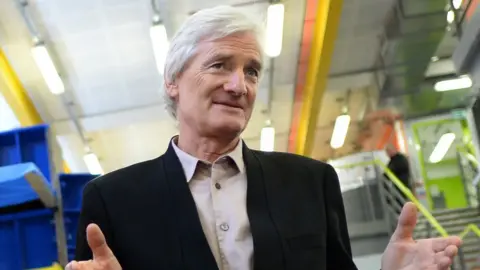Dyson Covid-19 ventilators are 'no longer required'
 BBC
BBCDyson has said the medical ventilator it developed to help treat patients with Covid-19 is no longer required.
It began developing a device in response to a government appeal for firms to take part in a national effort to increase the number of ventilators.
But in a note to staff, founder Sir James Dyson said that demand for ventilators had been less than first envisaged.
The Cabinet Office said that tests on ventilators are still ongoing.
Dyson's ventilator has been undergoing clinical tests in recent days and the government had previously said it intended to order 10,000 machines.
But Sir James told his staff that only a quarter of those available were currently being used.
As a result, he said, the government did not need to acquire as many of them.
 PA Media
PA MediaThe company has so far spent around £20 million on the project, which Mr Dyson said he would fund himself, without asking for public funds.
The Cabinet office, which has been coordinating the effort to boost ventilator production, insisted that a number of devices were currently undergoing testing and no decisions had been made regarding their use.

What is a ventilator?
- A ventilator is a machine that helps a person breathe by getting oxygen into the lungs and removing carbon dioxide
- Ventilators can be used to help a person breathe if they have lung disease or another condition that makes breathing difficult. They can also be used during and post-surgery
- A tube, connected to a ventilator machine, is placed in a person's mouth, nose or through a small cut in the throat (called a tracheostomy)

Dyson was one of many large manufacturers which responded to the call from the UK government to reconfigure their design teams and factory lines to produce much-needed ventilators.
Another consortium of medical, military and civil engineering companies - including Airbus, Meggitt, GKN and others - instead worked to ramp up the production of an existing design.
The UK government last week gave regulatory approval to that ventilator design to be made by the consortium and put in an order for 15,000 of them as part of efforts to combat the coronavirus.


Just over a month ago, it looked as though the country was facing an acute shortage of ventilators during the Covid-19 epidemic.
The government appealed to businesses to help out. Dyson came forward with plans to produce a brand new design.
Getting approval for a new design inevitably takes time - and while that process has been going on, it seems the outlook has changed and the shortage risks becoming a glut.
According to Sir James Dyson, his devices simply aren't needed any more. But is it true - or has the company encountered other problems?
The NHS currently has access to nearly 11,000 ventilators, and production is being ramped up.
Last week, the government ordered 15,000 machines from VentilatorChallengeUK - a group which already has the regulatory approvals it needs
At the same time, the total number required has clearly fallen - as doctors have found less intrusive treatments can be effective in keeping patients alive.
The Health Secretary, Matt Hancock recently suggested that 18,000 will be needed in total - around half the figure that was being suggested just a few weeks ago.
So it's fair to say the 10,000 units Dyson was expected to make don't seem to be required - in the UK at least. But the company is still hoping other countries are able to make use of them.
Meanwhile its design is still undergoing clinical trials. The company insists as far as it is concerned, those trials have been going well - and that the project itself will continue.

